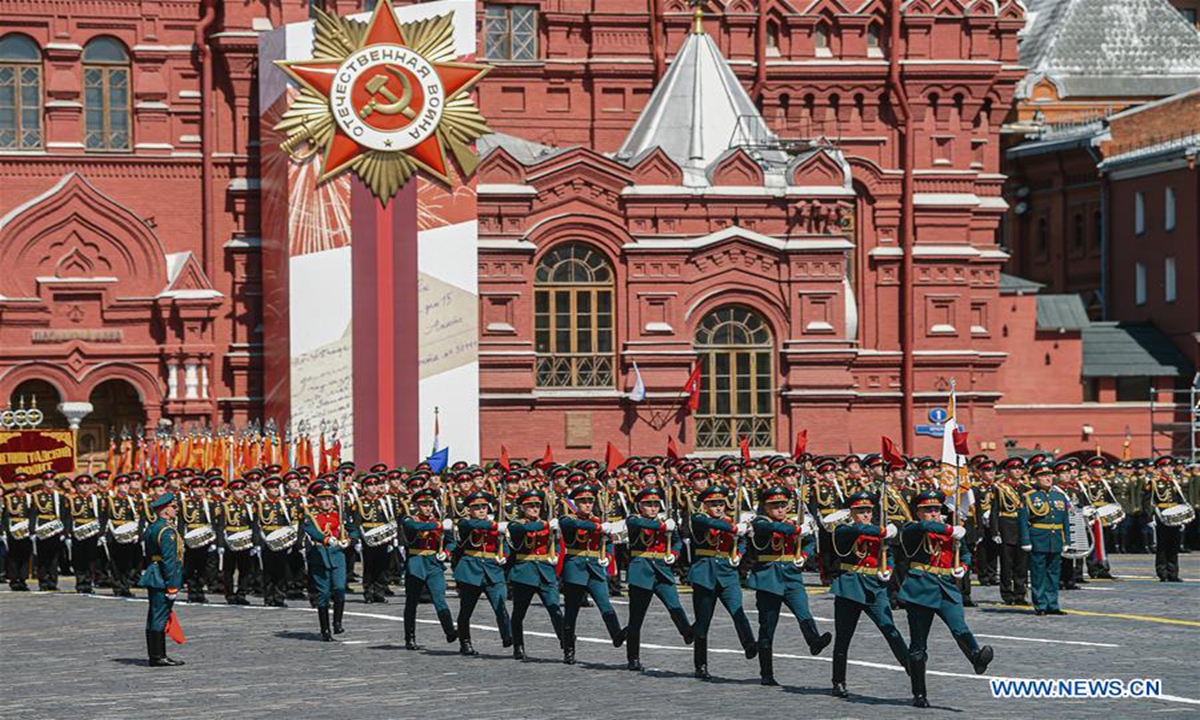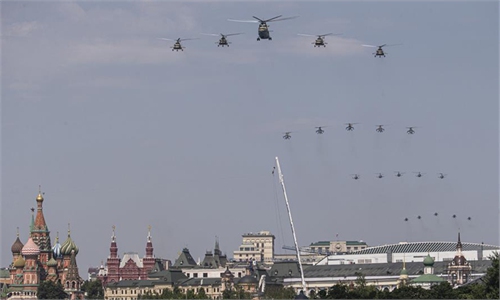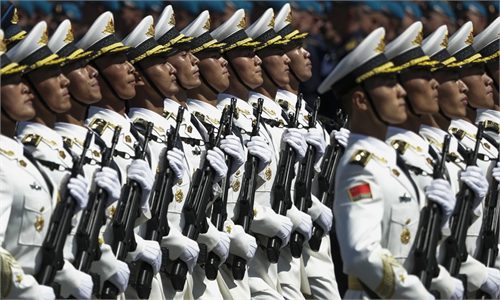
Russian national honour guard soldiers march during the military parade marking the 75th anniversary of the victory in the Great Patriotic War on Red Square in Moscow, Russia, on Wednesday. Photo: Xinhua
On June 24, Russia held a military parade to commemorate the victory in the Great Patriotic War. Right before the parade, President Vladimir Putin discussed in an article in US Magazine National Interest the shady deals between the great powers of Europe before the outbreak of World War II.
In recent years, Russia has received great pressure from the West regarding the historical assessment of WWII. The military parade and Putin's public opinion offensive are a powerful rebuttal to the West.
Indeed, the assessment of WWII has become one of the disputes between Russia and the West, and also a staple game among great powers.
In 2015, Russia held a military parade in Moscow to commemorate the 70th anniversary of the victory in the Great Patriotic War. The event was boycotted by the US and European powers. In 2019, Western countries excluded Russia from the commemorative event of the Normandy landing. They were inclined to list Russia with the Nazis as one of the initiators of WWII. Since the Ukraine crisis, there has been a collective demand in the West to stigmatize the Soviet Union on the historical evaluation of WWII. For Western powers, the battle for a greater or overacting master narrative of history is actually about the battle of international status between the West and Russia. These historical disputes are deeply entangled with realpolitik.
The West has adopted all-round measures to portray Russia as an authoritarian and autocratic pre-modern state. Although the Soviet Union had a disputable history in Poland and the Baltic Sea in the early days of WWII, the Western approach to this historiographical matter is only for amplifying Moscow's responsibilities and overlooking its contributions.
The Western approach is unacceptable for Russia under Putin's rule. Since he came into power after Boris Yeltsin in 1999, the conception of history has undergone an evolutionary process, and his perception of the Soviet Union has also changed. At the beginning of this century, Professor Andrei Borisovich Zubov was commissioned to write A History of Russia: The 20th Century, a history textbook for Russia's high schools, in which he exposed unreservedly the dark side of the Soviet history. At that time, Russia held a paradoxical attitude toward the Soviet Union. From the perspective of international politics, Russia inherited the Soviet Union's international status and main hard power. However, Russia deliberately evaded its relationship with the Soviet Union. It instinctively eliminated Soviet memories from a historical perspective.
In the Putin era, especially after the Ukrainian crisis, the confrontation with Western countries had awakened and stimulated Russia's historical memory as a great power. Russia's mainstream view of history has gradually changed, and criticism of the Soviet Union has been diminishing. Instead, more emphasis has been placed on the Soviet Union's contribution to Eurasian nations and the world history. As a result, when the Russian Constitution was amended in 2020, the Soviet Union was included in the chapters as a stage of Russian history, making it clear with national will that the Russian Federation is the heir to the Soviet Union.
The commemorative activity is a feasible path connecting history with reality. On the issue of historical evaluations of WWII, there are reasons for Russia to vie with the West for the discourse power.
From the perspective of national cohesion, denying the Soviet Union's achievements in WWII hurts Russians' emotions. It directly threatens their national pride about their defeat of the Nazis.
From the perspective of realpolitik, Russia is still a world power today by virtue of the international status left over by the Soviet Union - including its permanent seat at the United Nations Security Council. The Soviet Union's position in the postwar international system relied on its great sacrifices and contributions in WWII. Denying the Soviet Union's role is tantamount to denying the legitimacy of its high international status following the war. It also casts doubt over the international status Russia has today.
Looking at the commemorations from the 70th to the 75th anniversary of the victory in the Great Patriotic War, we can see the fierce fight between Russia and the West regarding the politics of WWII memories. Out of the need of realpolitik, the West can ignore historical truth, and in the post-truth era, the West can use its discourse power to hide the history. It is necessary to support fair evaluations of WWII.
The author is a post-doctorate researcher from the Centre for Russian Studies, East China Normal University. opinion@globaltimes.com.cn


